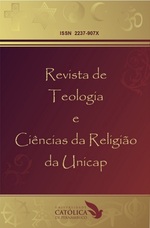THE AVAILABILITY AND UNAVAILABILITY OF WISDOM: THE DIALECTICS OF WISDOM IN PROVERBS AND JOB
DOI:
https://doi.org/10.25247/paralellus.2021.v12n30.p433-447Keywords:
Hebrew Bible, wisdom literature, literary-theological analysisAbstract
The article analyzes the literary strategies used in Proverbs 1:20-33; 8:1-36; 9:1-6 and Job 28:1-28 comparing how these different poems thematize wisdom in order to characterize its availability and unavailability to humans. The choice of these texts is based on objective criteria: 1. in them the availability and the ways to find wisdom are enunciated; 2. as for dating the texts are contemporary, dated between the end of the period of Persian domination and the beginning of Greek domination; 3. the texts are part of the final edition of the respective books, in collection of poems in Prov. 1-9 and in Job as an edition between the dialogues of Job and his friends (3-27) and the divine intervention (38-41); 4. The texts play an important literary-theological role in their location in the book. Therefore it also analyzes the function of this characterization in the editing of the books of Proverbs and Job. Finally, the analysis of the literary dialectic of the availability and unavailability of wisdom contributes to an understanding of the same dialectic in human experience.
Downloads
References
BHS. Bíblia Hebraica Stuttgartensia. Stuttgart: Barueri: Deutsch Bibelgesellschaft: Sociedade Bíblica do Brasil, 2009.
BIBLEWORKS. BibleWorks 10. 2015. [software]
BÍBLIA DE JERUSALÉM. Bíblia de Jerusalém: nova edição revista e ampliada. São Paulo: Paulus, 2006.
CLINES, D. J. A. Word Biblical Commentary: Job 21-37. Nashville: Thomas Nelson Publishers, 2006.
FOX, M. V. Proverbs 1-9: A new translation with introduction and commentary. New Haven; London: Yale University Press, 2008. (Anchor Yale Bible Commentary)
HEINEM, Karl. O Deus indisponível: o livro de Jó. São Paulo: Paulinas, 1982.
JENNI, Ernst; WESTERMANN, Claus. Diccionario Teologico Manual del Antiguo Testamento. Madrid: Cristiandad, 1985. [Tomo II]
LEVEQUE, Jean. Jó: o livro e a mensagem. São Paulo: Paulinas, 1987. (Cadernos Bíblicos)
LÍNDEZ, José Vílchez. Sabedoria e sábios em Israel. São Paulo: Loyola, 2011. (Coleção bíblica Loyola).
LORENZIN, Tiziano. Livros Sapienciais e Poéticos. Petrópolis: Vozes, 2020. (Introdução aos Estudos Bíblicos).
MARTIN-ACHARD, Robert. Da morte à ressurreição segundo o Antigo Testamento. Santo André, SP: Academia Cristã, 2015.
MURPHY, R. E. Word Biblical Commentary: Proverbs. Dallas: Word Inc., 2002.
ORTIZ, Pedro. Dicionário de hebraico e aramaico bíblicos. São Paulo: Loyola, 2010.
PINTO, Sebastiano (org). Provérbios: introdução, tradução, comentário. São Paulo: Loyola, 2018. (Coleção bíblica Loyola).
POPE, M. H. Job: Introduction, translation, and notes. New Haven; London: Yale University Press, 2008. (Anchor Yale Bible Commentary)
REYBURN, William D. A handbook on the book of Job. New York: United Bible Society, 1992. (UBS Handbook Series).
ROSSI, Luiz Alexandre Solano; NASCIMENTO, Lucas Merlo (orgs). O livro de Jó: leituras e reflexões. São Paulo: Recriar, 2021.
SCHMID, Konrad. História da Literatura do Antigo Testamento: uma introdução. São Paulo: Loyola, 2013. (Coleção bíblica Loyola).
SCHWIENHORST-SCHÖNBERGER, Ludger. Um caminho através do sofrimento: o livro de Jó. São Paulo: Paulinas, 2011.
TERRIEN, Samuel. Jó. São Paulo: Paulus, 1993. (Grande Comentário Bíblico)
Downloads
Published
Issue
Section
License
Copyright (c) 2021 Luiz Alexandre Solano Rossi, Luiz Alexandre Solano Rossi, Lucas Merlo Nascimento

This work is licensed under a Creative Commons Attribution 4.0 International License.
A submissão de originais para a Paralellus implica a transferência, pelos autores, dos direitos de publicação eletrônica. Os direitos autorais para os artigos veiculados neste periódico são do autor; todavia, são da revista os direitos sobre a primeira publicação. Os autores somente poderão fazer uso dos mesmos resultados em outras publicações se indicarem, claramente, que a Paralellus foi o meio originalmente utilizado. Em decorrência do fato de ser a Paralellus uma revista de acesso público, é permitida a utilização gratuita dos artigos em aplicações educacionais e/ou científicas não comerciais, desde que respeitando-se a exigência de citação da fonte (Texto atualizado em 16-11-2020).

















